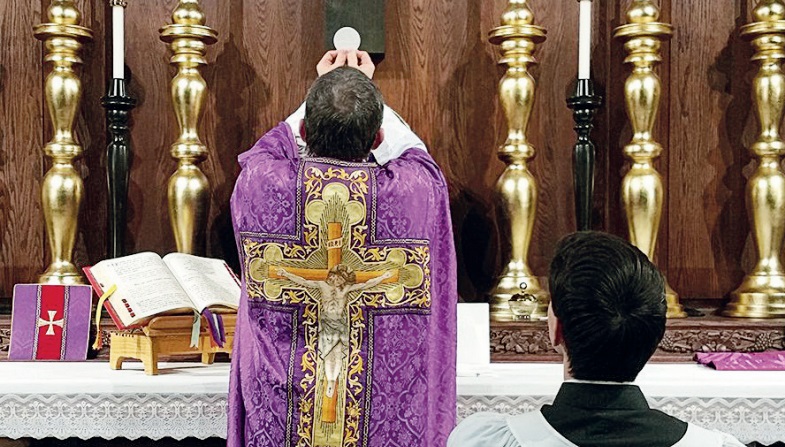Pope Francis calls for unity in the celebration of the Mass
Since many have asked what I think about the Holy Father's new motu proprio Traditionis Custodes, which restricts the celebration of the Latin Mass, I’ll offer a few of my thoughts.
Jul 24, 2021

By Fr James Martin, SJ
Since many have asked what I think about the Holy Father's new motu proprio Traditionis Custodes, which restricts the celebration of the Latin Mass, I’ll offer a few of my thoughts.
First, I know that for many people who celebrate and participate in the Latin Mass, this was a difficult document to read, as well as something of a surprise, even a shock.
Second, while I’ve never celebrated a Latin Mass (I’m using a shorthand for several variations of the Mass in Latin), I have, as a Jesuit, attended several, both before and after the publication of Pope Benedict’s own motu proprio, Summorum Pontificum, in 2007.
I enjoyed those Masses, but I also feel more comfortable with Mass in the vernacular, which is what I celebrate every day. And I’ve enjoyed Mass in the vernacular in many languages — in English of course, but also in Spanish on the Lower East Side of Manhattan, in Swahili in Kenya, in French in Lourdes, in Italian in Rome, and in Arabic in the Holy Land.
So, I most enjoy Mass when it is celebrated in the vernacular. But, as I’ve written before, if something brings someone closer to God (and I’m speaking of those who appreciate the Mass in Latin) it is to be reverenced. So, I reverence the devotion that many have for the Latin Mass.
At the same time, we must take seriously Pope Francis’s consultation with bishops from around the world, in which he inquired about the on-the-ground results of Summorum Pontificum.
Some have rejoiced in the greater freedom for the celebration of the Latin Mass since Benedict XVI’s document, but it has also been, sadly, a source of growing, and sometimes, heated, division among some Catholics. At least in the United States, some Catholics now speak of “Traditional Latin Mass parishes,” as if in opposition to “Vatican II parishes.” That does not bode well for unity.
Since 2007, several people have told me that they cannot wait for the “real Mass” (that is, the Latin Mass) to supersede the “Vatican II Mass” (Mass in the vernacular), which they regard as banal, superficial or irreverent. And many people have critiqued me (both online and in person) for failing to celebrate the Mass in Latin, as if this is made me a less devout priest.
For the record, I was two years old when Sacrosanctum Concilium, the Second Vatican Council’s document on the liturgy, was published. I grew up in an era where the Mass was always in the vernacular.
But far more important than these anecdotes, which are from one priest in one country, is the response from bishops from around the globe. This is an example of Pope Francis listening to the Holy Spirit at work in the world, and another instance of his desire for “synodality."
As an aside, remember that, as Austen Ivereigh reminded us, Pope Benedict told reporters in 2007 that Summorum Pontificum would be reviewed if problems arose. Benedict’s document, motivated by a deep desire for unity, was responding to a need in the Church — that is, it was a way of making those who appreciated the Latin Mass feel more at home, and thus fostering unity.
As Michael Sean Winters reported, Benedict never intended to start a movement, and certainly not an ideology. That was not the way of Benedict, for whom Church unity was an essential and longstanding goal.
After consulting with the bishops, however, Francis has concluded that Benedict’s document, although aimed at unity, has unintentionally caused division. The sacrament of unity was, in some places, starting to lead to serious disunity.
Overarching all this is the fact that the Second Vatican Council’s clear intent was that the Mass generally be celebrated in the vernacular and that this be the primary way that people experience the Mass. This was one of main ways that Vatican II hoped to promote what Sacrosanctum Concilium called the “full, active” participation in the sacrament.
And, as James Keane reported in America, one of the main reasons that St Paul VI made provisions for retaining the Latin Mass was for older and infirm priests for whom the changes would be disruptive. But for Paul VI, the Mass in the vernacular was the way forward.
Overall, I agree with Francis’ “motu proprio,” not simply based on my own experience of the growing divisiveness over the Mass, but even more, based on his consultation from bishops around the world, who have weighed in on the experiences of the People of God. It was a kind of discernment in which the Pope consulted widely, listened to the Spirit and decided.
I hope those who enjoy the Latin Mass can receive the Holy Father’s motu proprio in that way.
Reprinted from Fr Martin’s Facebook page (https://web.facebook.com/ FrJamesMartin)







Total Comments:0